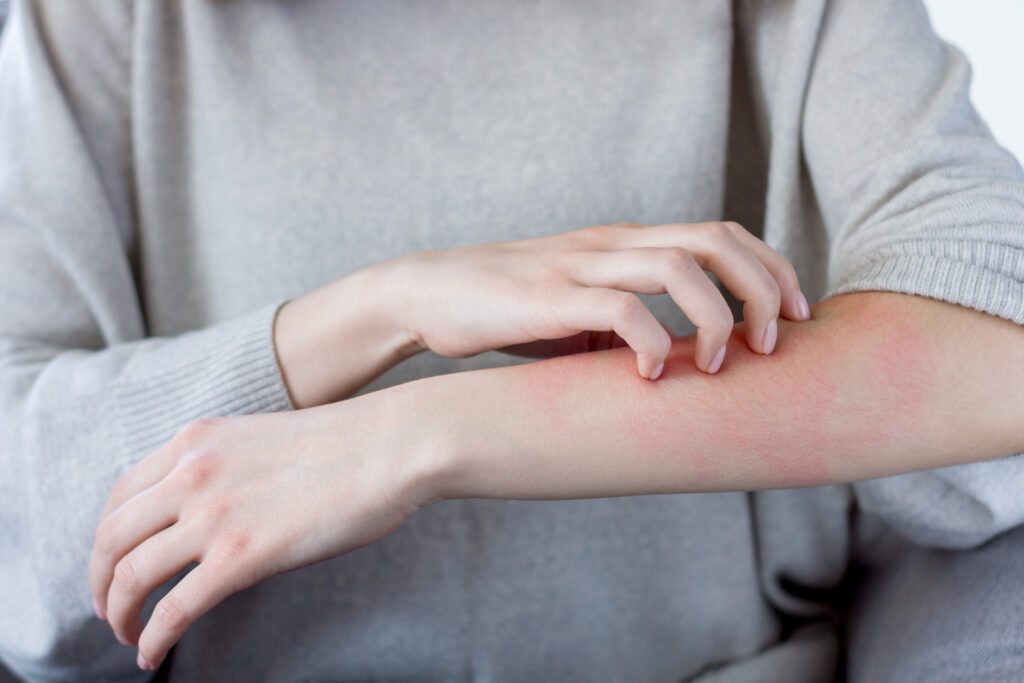Dermatitis
Dermatitis is a general term used to describe a common irritation of the skin. There are many different types of dermatitis, each with its own symptoms, causes, and treatments.
People who suffer from dermatitis often feel uncomfortable, and some experience feelings of low self-esteem. Fortunately, there are many dermatitis treatment options, most of which can be bought over the counter without the need for a prescription.
Read on to discover
- What is dermatitis?
- What are the most common symptoms of dermatitis?
- What are the different types of dermatitis?
- What causes dermatitis?
- Does stress cause dermatitis?
- Who gets dermatitis?
- Where does dermatitis form on the body?
- How is dermatitis diagnosed?
- What are the best dermatitis treatments?
- How to prevent dermatitis
- Dermatitis FAQ
What is dermatitis?
Dermatitis is a broad term that is used to describe a number of skin irritations and rashes.
In fact, if you break down the word “dermatitis,” it means inflammation of the skin. “Derm” means skin, and “itis” means inflammation.There are several different types of dermatitis, and symptoms can range from mild to severe and can cause a range of problems, including discomfort and low self-esteem.
Dermatitis is not a serious health condition, is not contagious, and can be managed and treated using over-the-counter medications.
What are the most common symptoms of dermatitis?
Although each type of dermatitis comes with its own unique symptoms, there are several common signs that tend to be present in all cases of dermatitis. These include:
- Itchy skin
- Dry skin
- Swollen skin or a rash
- Blisters
- Flaking skin (dandruff)
- Thickened skin
- Bumps in the hair follicles
- Painful ulcers
- Fluid-filled ulcers

What are the different types of dermatitis?
There are many different types of dermatitis, each with their own symptoms, causes, and treatments.
Some of the most common types of dermatitis are:
Atopic dermatitis (eczema)
Atopic dermatitis, more commonly referred to as eczema, affects between 15 and 20% of the population. There is no cure for atopic dermatitis, but you can manage your symptoms with the right medication and atopic dermatitis treatment.
Atopic dermatitis usually manifests as dry, red, itchy, and bumpy skin. Eczema is not contagious and does not harm your body.
This skin condition is common in children and is also more prevalent in people who have a personal history of asthma or allergies.
Contact dermatitis
Contact dermatitis is a type of dermatitis that is caused by an allergic reaction or irritant reaction. The most common symptoms of contact dermatitis are a painful or itchy skin rash. Contact dermatitis can occur after a single exposure to an irritant or from prolonged contact with something that irritates your skin.
People who work in occupations such as construction, plumbing, healthcare, and beauty are more likely to develop contact dermatitis.Contact dermatitis is not contagious and can be easily treated in most cases.
Statis dermatitis
Statis dermatitis, also known as gravitational dermatitis and venous eczema, is typically caused by poor circulation. This type of dermatitis usually affects people over the age of 50 and is more common in women than men.
You are more at risk of developing statis dermatitis if you have varicose veins, high blood pressure, you are obese, or you have had multiple pregnancies.The most common symptoms of statis dermatitis are ankle swelling, orange/brown specs of discolouration on the legs, itching, scaling, and dryness. If statis dermatitis is left untreated, open sores can form on the lower legs and the tops of the feet.
Perioral dermatitis
Perioral dermatitis is an inflammatory skin condition that affects the skin around the mouth. Displaying as a rash, if left untreated, this can spread to the nose and even around the eyes.
This condition is most common in women between the ages of 20 and 45 years old, but it can occur in people of all ages and in men also.
Perioral dermatitis is often chronic and can last weeks or even months.
The most common symptoms of perioral dermatitis are a rash of red bumps around the mouth, burning or itching, and redness. The bumps may contain pus or fluid, and sometimes, they can be mistaken for acne.
Other types of dermatitis include:
- Diaper dermatitis (nappy rash)
- Dyshidrotic dermatitis
- Neurodermatitis
- Nummular dermatitis
- Dermatitis herpetiformis
What causes dermatitis?
There are many different causes of dermatitis, and some groups of individuals are more at risk than others.
Age
Although dermatitis can occur at any age, it is more common in children than it is in adults. People who suffer from dermatitis often find that it develops in infancy.
Allergies & Asthma
If you have allergies, hay fever, or asthma, you are more likely to suffer from a type of dermatitis known as atopic dermatitis
Genetics
People who have a family history of dermatitis, especially close relatives such as parents or siblings, are much more likely to experience some form of dermatitis.
Occupation
Certain occupations that involve contact with metals, solvents, or cleaning supplies can cause dermatitis. If you work in the healthcare industry, you are also more at risk of hand dermatitis.
Health conditions
Health conditions such as congestive heart failure, Parkinson’s, and HIV can put you more at risk of developing seborrheic dermatitis.
Contact with an irritant
One of the most common causes of dermatitis is contact with something that irritates the skin and causes an allergic reaction. This could be poison ivy, perfume, or a body cream.
Other possible causes of dermatitis include:
- Dry skin
- Bacteria
- Stress
- Weakened immune system
- A viral infection
Does stress cause dermatitis?
Yes, stress can cause dermatitis, and it can also make your symptoms worse. If you are worried that you may be stressed and that this is causing your dermatitis, there are steps you can take to actively lower your stress levels, including:
- Practice breathing exercises
- Exercise daily
- Get sufficient sleep
- Limit your caffeine and alcohol intake
- Eat a balanced diet
- Keep a journal
- Talk to family and friends
- Avoid unhealthy habits

Who gets dermatitis?
Dermatitis can affect anyone. However, there are certain individuals who are more likely to develop this common skin condition. These include:
- Babies can get cradle cap and nappy rash
- Young children often develop eczema in childhood
- People with celiac disease are more prone to dermatitis herpetiformis
- People who work with chemicals are more likely to get contact dermatitis
- Atopic dermatitis is more common in females and people with a history of dermatitis
Where does dermatitis form on the body?
The location of dermatitis depends on the type of dermatitis that you have.
For example, with atopic dermatitis, this can occur anywhere on the body or face.
Seborrheic dermatitis is a type of dermatitis on face, scalp, and ears.
Periorificial dermatitis is sometimes known as eyelid dermatitis, mouth dermatitis, and nose dermatitis, as these are the areas of the face that are typically affected.
You can also get:
- Hand dermatitis
- Vulvar dermatitis
- Dermatitis on feet
- Dermatitis on fingers
- Lip dermatitis
- Dermatitis on neck
- Dermatitis on forehead
How is dermatitis diagnosed?
If you have only recently developed a skin irritation or rash, it can be a good idea to book an appointment with your GP so that they can give you an official diagnosis.
During your appointment, your doctor will ask you questions about your skin and your symptoms. They will also carry out an examination of your skin and the affected areas.
In most cases, your doctor will be able to diagnose dermatitis on the spot, but if there is any doubt, they may:
- Take a blood sample
- Carry out a skin biopsy
- Perform a skin allergy test
What are the best dermatitis treatments?
The type of dermatitis treatment that you need will be dependent on the type of dermatitis that you have.
Some of the most common dermatitis treatments are:
- Moisturising creams such as Locobase Repair or Locobase Protect. These can be used for all types of dermatitis symptoms.
- Calcineurin inhibitors. These are used to reduce inflammation in all types of dermatitis.
- Corticosteroid creams and ointments. These are used to reduce inflammation in all types of dermatitis.
- Phosphodieterase-4 inhibitors. These can also help reduce skin inflammation.
- Biologics. This is an injection that blocks the function of the immune system that affects dermatitis.
- Antihistamines. These are commonly used as contact dermatitis treatment.
- Antibiotics. These are prescribed as perioral dermatitis treatment.
How to prevent dermatitis
There are several steps that you can take to reduce your risk of developing dermatitis, including:
Spend less time in the bath/shower
Long baths and showers can make dry skin worse, so you should try to limit each bath or shower to between 5 and 10 minutes. You should also avoid using hot water and keep the temperature comfortably warm instead. You may want to try adding a few drops of essential oils to your bath, as this can help to soothe itching and lock in moisture.
Use a gentle cleanser
Harsh cleansers or ones that contain perfume can irritate sensitive skin and make the symptoms of dermatitis worse. Instead, use a gentle cleanser that is specially formulated for people with dry or sensitive skin.

Dry yourself carefully
When you get out of the bath or shower, you need to make sure that you are gentle with your skin. Rather than rub yourself dry, gently pat your skin with a soft towel or allow yourself to air dry.
Invest in a good moisturiser
While your skin is still slightly damp, apply a moisturiser that is designed for dry or very dry skin, is suitable for the whole body, and is unscented. Make sure that you moisturise daily as this helps to hydrate the skin and lock in moisture.
Dermatitis FAQ
What is the most common dermatitis?
The most common type of dermatitis is atopic dermatitis, also known as eczema. This skin condition often runs in families and is more common in people with allergies and asthma.
What is the difference between eczema and dermatitis?
Eczema is a type of dermatitis known as atopic dermatitis.
What is the difference between dermatitis and psoriasis?
Dermatitis and psoriasis can look similar, but they are two different skin conditions. In psoriasis, the scales on the skin are often thicker, and the edges of the scales are more defined.
What can trigger dermatitis?
Dermatitis can be triggered by contact with something that irritates the skin, such as a cleaning agent, poison ivy, perfume, or jewellery that contains nickel. Cold weather and dampness can also trigger dermatitis.
Is dermatitis caused by stress?
Stress can cause dermatitis, and it can also make your symptoms worse. If you are worried that you may be stressed and that this is causing your dermatitis, there are steps you can take to lower your stress levels.
Why does dermatitis get worse at night?
Dermatitis often gets worse at night because your body temperature decreases when you are asleep, which can make your skin feel itchier. To combat this, apply a dry skin cream directly before bed to keep your skin hydrated throughout the night and minimise any discomfort.
Does dermatitis ever go away?
Depending on the type of dermatitis that you have, it may go away. Contact dermatitis, which is caused by an allergic reaction to an irritant, typically goes away with treatment and by avoiding the irritant.
Atopic dermatitis is often chronic, and you may have to manage your symptoms rather than cure them.
How do you treat dermatitis?
There are many different treatments for dermatitis, including moisturising creams, antihistamines, and light therapies. The exact treatment that you need will be dependent on the type of dermatitis that you have. Speak to your GP or dermatologist about the right treatment for your skin.
If you have dermatitis on feet, Footner is a highly effective over-the-counter remedy that speeds up the skin shedding process, leaving you with soft, flake-free feet. You do not need a prescription for this dermatitis treatment.
Do I need to see a doctor about dermatitis?
In most cases, you do not need to see your doctor about dermatitis. However, if your skin becomes painful, you are struggling to sleep, or you think you may have an infection, then you should make an appointment with your GP or dermatologist.
Is dermatitis contagious?
No, dermatitis is not contagious.
No products found